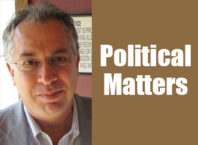In the Canadian elections last month, the Liberals swept away the Conservative government of Prime Minister Stephen Harper. Liberal leader Justin Trudeau, 43, will become the new Canadian premier.
The elections also ushered in 10 indigenous MPs (Members of Parliament), out of a field of 54 Native candidates across Canada. One of the Aboriginal (Indian) victors, Liberal MP-elect Robert-Falcon Ouellette, in the riding (district) of Winnipeg Centre, told CTV News: “In the city of Winnipeg, and right across this country, so many First Nations children are in care of the state and they’re not with their families, and there are things we can be doing about that.”
Ouellette said that 89 percent of Indigenous children are not in care of the state because of abuse; rather, the problem is poverty, “the inability of parents to provide good housing and good food for their children.” The Liberal MP-elect also cited the need to address the educational needs of Native children, and the dire reality of “murdered and missing indigenous women.”
Trying to understand what the Liberal victory means for First Nations people in Canada, I contacted two of the founders of Idle No More, the Indigenous sovereignty movement that began in Canada and came to global prominence, in 2012.
In an email interview, Jessica Gordon, one of the four women who founded Idle No More, told me that past Canadian governments have had “unfavorable and oppressive policies regarding Indigenous rights and sovereignty. Justin Trudeau, leading the Liberals in this newly-formed government, should be taken with a grain of salt; because, as we know, corporations and money are much more influential than someone with a big heart and good intentions.”
Gordon noted that Justin Trudeau’s father, former Canadian Prime Minister Pierre Trudeau, said, regarding Indigenous people in Canada: “If you no longer speak your language and no longer practice your culture, then you have no right to demand aboriginal rights from us, because you are assimilated with the ruling power.”
As to the elder Trudeau’s assertion, Gordon said, “We can take this as the reality of the belief of any government, or we can take this as a challenge. Yes, we have a horrible history of genocide and because of this, we do not all speak our language or practice our culture. To be self-determined we cannot rely on anyone but ourselves to prove this quote wrong, although in the spirit of reconciliation and Treaty, the government has a moral and legal obligation to see this happen as easily and swiftly as possible.”
She added, “Justin Trudeau has an opportunity now to not only reconcile the sins of his father and previous/ongoing genocide, but also show that he and other settlers have learned from their ancestors’ mistakes.”
There was a high Native turnout at the polls in Canada, according to press reports. But Sylvia McAdam (Saysewahum), an Idle No More co-founder, didn’t participate. In a phone interview from her home in the Treaty 6 First Nations – “two and half hours north of Saskatoon, in what is now known as Saskatchewan” – McAdam expressed deep pessimism about the new Liberal government.
I mentioned attending survival gatherings, in 1980 and 1981, in Pinehouse, a tiny Cree village in northern Saskatchewan. The gatherings hosted by local residents and American Indian Movement (AIM) activists tried to organize popular opposition to uranium mining, specifically, the Key Lake mine, which eventually was developed.
“The situation has gotten worse,” McAdam said.
As far as the Liberals coming to power, she commented: “You know, that’s a loaded question. I’m not saying that you’re not genuine, but if you genuinely want to know about what it’s done, being assimilated into the colonizer’s system, you can take a look at the loss of language; the loss of indigenous knowledge; the increased devastation to the land and water on our lands… We’re more assimilated today than we ever have been.”
Voting in the “colonizer’s system is devastating,” in McAdam’s view. The Canadian federal government “continuously” violates the treaty “terms and promises” made with the First Nations, “and it’s getting worse and worse as the years go by, and more and more indigenous people are forgetting about that. I didn’t vote. I’m what you’d call a ‘sovereigntist,’ in the English language; in my language, I’m known as a person who defends and protects the land, because without the land we’re finished, we’re finished as a people.”
The Harper government was largely reviled by the First Nations people, which is more than four percent of Canada’s population. Obviously, Indigenous opinion is mixed about what the Liberals can do to remediate social inequities in Canada.




